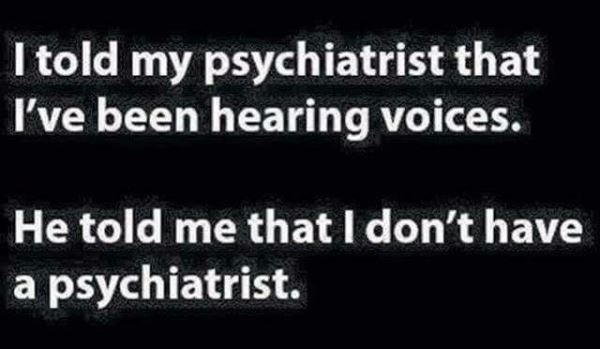Lord, Have Mercy!

We’ve all heard plenty about Missouri’s passing a Prescription Drug Monitoring Program. Our State is the only one left that hasn’t fallen for more big brother involvement in our prescription drugs. So far, this bill has only passed the House and still has to clear the Senate.
The selling point behind it is that it will stop people from having easy access to prescription drugs because a database will send off alarms if someone gets too many prescriptions from too many different doctors.
Surprise! The 49 states that already have prescription drug monitoring still have drug abuse!
In my County, people can’t buy pseudoephedrine without a prescription from a doctor because government is trying to solve a problem far bigger than its capacity.
Unless the government is forcing us to take drugs, the government is incapable of correcting the problem. This is a family issue and needs to be dealt with in the jurisdiction of the family.
The family is the original prescription drug monitoring program. The family members are closest to the drug abuser and are the only ones who see and know what’s happening and can intervene when there is a problem.
Families need to stop asking their governments to fix their problems.
On our show this week, we talk with Ellen Miller, author of a new book, “Lord, Have Mercy!” She shares with us her own struggles with parenting and includes a happy story about her son who was on meth for 3 1/2 years. It will inspire you!
Do you think the government should have a database that keeps track of what drugs we’re taking?
WHAT YOU CAN DO…

1.) Honor Flight Request. My dad, Gordon Gosh, is a World War II and Korean War Navy Veteran. He’s going on an “Honor Flight” this month. If you want to send him a letter, please mail it to me this week.
Here’s my address: Cynthia Davis, 1008 Highway K, O’Fallon, MO 63366.
2.) Let’s send the legislators a message! We elected them to uphold their constitutional duties. The last time I checked, there was no mention about the responsibility of government to provide oversight on what kinds of prescriptions we are taking.
3.) I am speaking this week in Sikeston, Missouri. Pray that the Lord will bless our message and the listeners who hear it. It’s going to take a great effort to save our Country, but we can do it!
If you have an event where you need a speaker, please let me know. I am dedicating my energy on the places where I can make the greatest difference. Please let the meeting organizer know that I can help your group understand the intersection of government and families in a way they may have never known before. If you want me to come and help your efforts to educate and motivate your network, please click this button here:
4.) The mission of Home Front continues. We need your involvement to fund our ongoing efforts, research and equipment. If you want to continue to support us in this effort, you can mail a check to this address:
Cynthia Davis, 1008 Highway K, O’Fallon, MO 63366.
PODCAST
Click here to listen to this informative podcast, or subscribe on:
iTunes / Google Play / More Optioins
A LITTLE BIT OF HUMOR



10 Comments
Maggie
As a health care professional, I greatly believe in a prescription drug monitoring program. Yes drug abuse will still continue however this is a tool health care professionals can use to decrease the potential for abuse and get help for patients seeking to abuse. The key thing to remember behind this bill is that ONLY health care professionals, who are already trained to handle delicate personal information, will have full access to the database. Government and police officers will not be able to easily access the database. This is only a tool to decrease abuse and increase help awareness for patients who need it.
Laura Butler
In my opinion, Maggie, people with health and drug addiction issues have to help themselves. No doctor or health care professional or government can do that for them. I do not believe the database will not be viewed by the government. If they are the ones mandating it, they will have access to it, otherwise, how can they be certain it is being used as they desire? It is no one else’s responsibility to take care of me. Forcing “help” on anyone, especially an addict, never works. They have to choose that for themselves.
Larry Wilson
Fortunately the evidence does not support your opinion.
And this is not about anyone forcing care on you; this is about an epidemic of people demanding drugs. We don’t use this database to force help on anyone, but to instead guide responsible prescribing practices.
I have never looked at a database and said “I have to get this person some help for addition.” I use these databases to see if patients are lying to me, or to help them remember what medications they take.
The irony is that if someone takes medications that are incompatible, prescribers will be criticized. Most people are unable to effectively describe their medication routine, so folks are demanding an impossible outcome where they want providers to know all of the medications that patients take but they don’t want them to have a database to review those medications.
Jeanne Schoettle
I hope and pray this bill does not pass. As innocent as anything begins it turns into a nightmare. I have a chronic illness and am already anxious with all the hoops to jump through. It is those who do not misuse that will pay the price. The lawbreakers just move on to something new.
George Thompson
The only drug-related data base any government should have is one monitoring its legislative, executive, and judicial branches and all those employed by same.
Susan
It seems there is an ulterior motive based on “protecting us”. (sarcasm) They always use our safety to get us to agree to losing more of our rights! BE CAREFUL what you wish for. They will use it to gain more and more power til the people will have none!
Laura Butler
The idea of either the state or federal government tracking even ONE MORE thing about me and my personal life or health, INFURIRATES me to no end! They have NO RIGHT to have a database of what medicines I take or why or how often. That is between me and my doctor and God.
Larry Wilson
As a provider, I do have an obligation to know what medicine you take and how often, and absent this database, it is impossible to know.
Most people who take medication pop the pills in their mouth every day, yet when they come to my office they can never remember what they take, what dose, or the frequency. Whether it’s because they are uninformed or deceitful, this database helps me as a provider to provide appropriate care.
And it also makes sure that providers are being diligent…you can be sure that the administrators of this database are more interested in prescriber practices than what patients are doing with their medication.
Corinne
With respect, yes, I do. I agree it needs to be dealt with in our families and our homes but I do believe it could be a useful tool and also save some lives. The abuse is so rampant. Being a volunteer for children removed from parents who are addicts and abusers, I want every tool available that could help keep these innocent kiddos with their parents. Just my thoughts. I love and respect you Cynthia. Do I think this is THE answer? Not at all, but a useful tool in an arsenal, yes.
Larry Wilson
This article shows a gross misunderstanding of prescription monitoring databases.
These databases were not developed for DotGuv to watch over patients, but for DotGuv to watch over providers. Additionally, DotGuv has shown little interest in seeing what people are taking which narcotics, but is more interested in seeing which providers are prescribing them.
These database are VITAL to me in dealing with patients who are massively more inclined to commit extensive fraud to obtain narcotics than providers are to prescribe them. Patients will lie to me about what medication they are taking, the frequency, and the dose. I can check this database and then make an informed decision about what if any additional medication should be prescribed.
People should NOT have “easy access” to the drugs that are listed on these databases. When they are misused (and patients are inclined to misuse them far more often than providers are inclined to improperly prescribe them), the outcome is devastating on both individuals and populations.
If your benchmark is that the 49 states that have monitoring programs still have abuse problems, then we should eliminate all laws…because none of them have eliminated any problems.
“Unless the gov’t is forcing us to take drugs, they are incapable of solving the problem.” While that comment is completely illogical, I’d remind you that healthcare providers are key players in addressing this problem, and we will be most successful when we have the tools to do so.
Your pie in the sky notions about family show even more naiveté regarding this issue because many people don’t have families, and many addicts that do have no problem devastating the lives of their families until they don’t want anything to do with the addict, so unless you want to regulate and mandate family involvement in the prescription process, your ‘solution’ is a non-solution.
Finally, these are developed by STATES, so this is a state’s rights issue. I thought constitutionalists were all about state’s rights. I can assure you that taking away this database will result in two things; first, people will resort to physician shopping for narcotics again. Even non-addicts will get involved because there is a sub-industry of people who don’t use prescription drugs but will lie to obtain them. Insurance providers pay for them, and then patients sell them on the street for a profit. Second, people wanting to get their hands on drugs will exacerbate the shortage of providers because they will increase the frequency of their healthcare encounters.
Don’t take this vital tool away from us.
If you really want to do something to reduce the impact of prescription narcotics, legalize marijuana. Every one of my patients who are given a choice between prescription narcotics and marijuana will choose marijuana every time…and this is OK with me because the untoward effects of cannabinoids is much less than prescription narcotics.